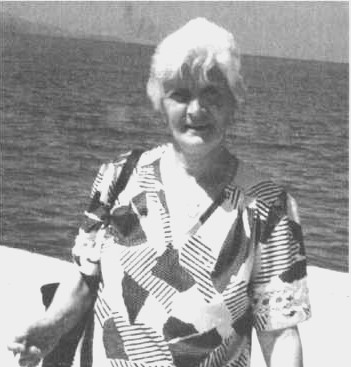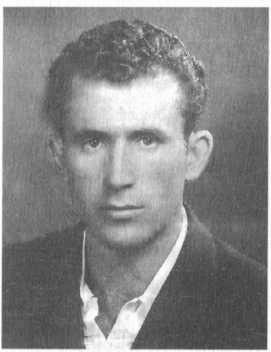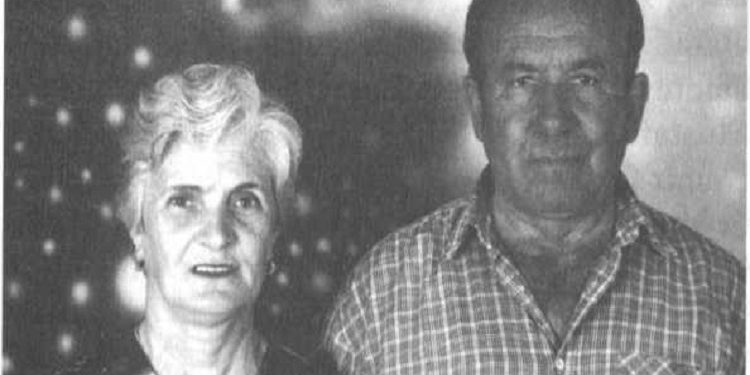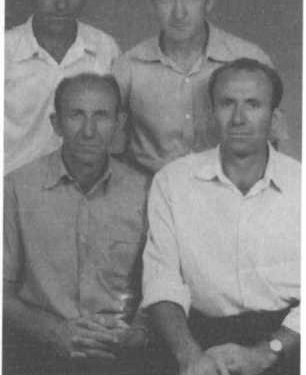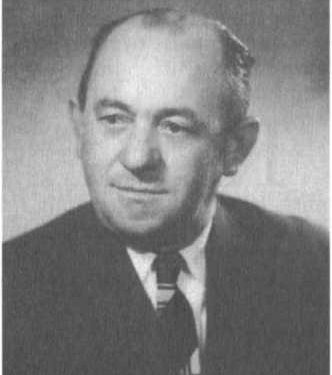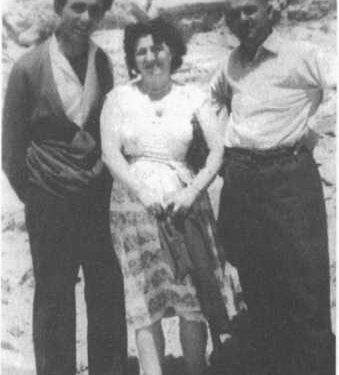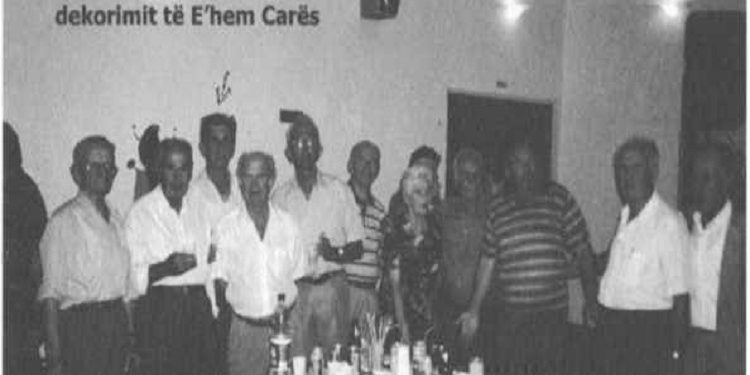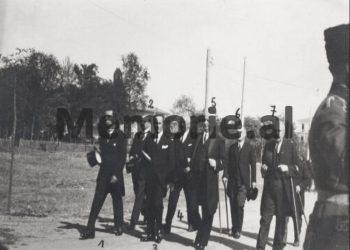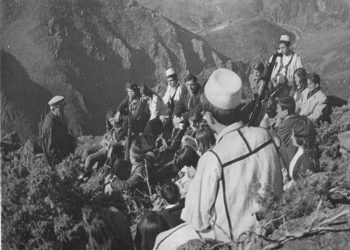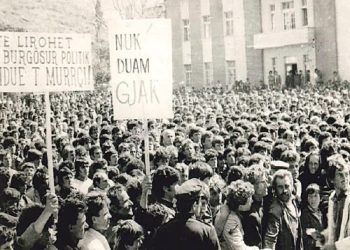By Sofika Prifti Cara
Part six
To Forgive…!
– The Old Kavaja Clan – CARA
Memorie.al publishes several parts from the book ‘To Forgive’, authored by Mrs. Sofika Prifti (Cara), published by the Institute for the Study of Communist Crimes and Consequences in Tirana, in which the author has described with detail and professional competence the history of one of the most prominent clans, not only in the city of Kavaja but also beyond – the Cara clan – which produced not only distinguished patriots who contributed to the national cause and the freedom of Albania, but also renowned intellectuals, graduated in the West, who later returned to the homeland, contributing in several fields of science and life. Yet, even though the descendants of the Cara clan dedicated their lives to the national cause, after the communists came to power at the end of 1944, they would be persecuted, imprisoned, and interned, and the fierce class struggle would pursue them until 1990, when the collapse of the communist regime began.
Continued from the previous issue
BARDHI’S “TRIAL”
After Bardhi’s arrest, rumors circulated through the city from different people. They were words colored with romance, adventure, and were not at all close to the truth. Some whispered that; in 1967, when Enver Hoxha would inaugurate the Rrogozhinë – Fier railway, Bardhi would blow up the train! (Which turned out not to be true!).
A lie with a long tail! There were others who said that Bardhi was an American agent! There were also those who said that he was caught at the border trying to escape abroad to Australia, to his father. (Bardhi was arrested at work!)
Many, many other words circulated that were driving us crazy. Bardhi was held for three months under investigation, and then we were notified that he would go on trial. I had not long given birth to the child and was ill, but I still went and listened to his trial. The judge, Gaqo Sheshi, read the indictment, which was not new to us, as we had heard it in the neighborhood “trial.” The prosecutor this time was Rrapi Mino, a rabid communist, a man who had himself destroyed a family and left a child with a single parent! He was like a poisonous snake, which his mother had given birth to only to do evil. With that man, not only his mouth, but also his fingers, spoke of death. He was merciless, ready to even order execution by firing squad.
At first, he asked Bardhi, coldly:
“What is your name”?
“Bardhi Cara,” my husband replied.
“How old are you?” was the second question.
“I am 29 years old,” was the answer.
“How many children do you have?”
“I know I have a four-year-old son, but I don’t know what I’ve been blessed with now!” Bardhi said, shrugging his shoulders.
“You have been blessed with a daughter; you now have two children,” the prosecutor spoke harshly, “but woe to those who don’t know what kind of father they have! Let alone that they, like you, will end up the same way!”
The prosecutor was being very “far-sighted” for my two children, one of whom was four years old, and the other newborn! And this sycophantic prosecutor wanted to appear like an oracle, predicting that our children would act like their father! That is why many of them came to a bad end later…! Just like that animal that eats its cubs! He spoke again with an arrogant tone: “You have grown too much; your heads should have been crushed in the cradle, you snakes who only spit venom against our Party, which is feeding you with bread, so to speak!”
Then they started calling the “witnesses,” who were their servile spies who got tangled up in their own words when speaking because their statements had no connection to each other, they were contradictory, and their slanders did not match the dates, days, months, and places. One spoke one way, and the other another. Bardhi’s lawyer was Kujtim Sina. The trial ended very quickly because the soup had been cooked long ago in the investigation offices, and despite Bardhi’s objections, he was sentenced to 16 years in prison as a; “sworn enemy of communism”(!?)
After three or four days, he was sent to Tirana prison (Kaushi at 313), which was the distribution center for prisoners to be sent to “camps” (not holiday camps!), as prisons were called at that time, throughout Albania. And after a week, Bardhi was transferred to the Skrofotina “camp,” near Panaja, Vlora, where they produced salt.
His sentence remained 15 years! A person can never find justice, the truth as it is, in a dictatorship state. In the conditions we were in, like all Albanians, it was futile to start seeking our rights; we would get very tired for nothing, because we would never find that right.
THE CONSEQUENCES OF THE SENTENCE
Enver Hoxha’s communist regime used numerous pressures and promises to impose the “will” that you should surrender. But I was determined to the death not to fall into their clutches. A coin has two sides: when you toss it up, you win or lose; only the yellowed leaf trembles and falls down, even when a light wind blows. These pressures began immediately after my husband’s conviction, vehemently demanding that I divorce him.
They sent me to work with tobacco, but even that seemed like a privileged job to them. They removed me from there too! To think that I was 22-23 years old, with two small children; I had to go every day to work in the agricultural cooperative, 4-5 hours away from home (at that time, the law was to go to the child every 3 hours until they turned 1 year old!)
Despite all these difficulties they were bringing me, they did not give up the pressure to separate me from my husband. In the enterprise, we had a head of cadres; “comrade” Marika Leka, while from the City Executive Committee, the chairwoman was a certain Kristina Aleksi. Both of them clung to me and would not leave me alone, time after time.
Thus, a moment came when I fell into depression. When they notified me to go to the Committee, it became a fixation for me to talk to myself, murmuring; “I won’t divorce him, I won’t divorce him!” while walking down the street. Another time, they told me the Chairwoman of the Committee was asking for me.
I set off for there; to get to the Committee building, there were two parallel roads, one leading to the gate of the sports field, the other to the Committee. However, I was completely confused and mistakenly took the road toward the sports field. I was walking, and my eyes weren’t working; I didn’t see at all that I had reached the Iron Gate, which was closed.
I only shook myself when I hit the iron with my head, and I felt a lot of pain because I was rushing, lest the time the Chairwoman was expecting me would pass. Then I came to my senses, as if I woke up from a trance that had gripped me with its claws. A large lump formed on my forehead from the blow. I did not go to the Committee that day.
I returned to my house, which sometimes I barely found; there, they bandaged my forehead, put a metallic five-lek coin on it so it wouldn’t swell, and later, the spot turned black. The next day, when I went to work, the head of cadres glared at me and said: “But why didn’t you go to the Chairwoman yesterday?!” I explained the mix-up of the roads, but she didn’t even care.
She looked at me suspiciously, and then said in an indifferent tone: “Go today at 10:00, the Chairwoman is waiting for you!” My head was pounding with pain, my forehead was swollen, numerous ominous thoughts were hitting me like hammers in the head, and I couldn’t orient myself.
I had five hundred troubles on my shoulders and could no longer make sense or find a solution (fesall) for them, as the saying goes. At 10:00, I set off to go to the Executive Committee, but again I confused the road and took the one leading to Tirana. I had reached the Sheqi Bridge, at the exit of Fier. Fortunately for me, because who knows where I would have ended up, some neighbors, including my father, were standing in line to buy tomatoes.
At the Sheqi Bridge, there used to be a barracks, the Sheqi farm, which produced tomatoes for export; sorting was done there, and the fruits that were outside the standard were dropped there and sold to the residents. First, the employees who worked there would take some, and then people from the city would go too. The line had to be held from 12 at night, stretching and stretching until morning, while the sales were made at one or two in the afternoon!
One of the neighbors apparently recognized me and told my father, in a low voice, pointing to me with her head: “Oh Petro! Look at your Sofija a little; she is talking to herself…! Ask her once where she is going?!” We had not spoken for six years, since I married Bardhi, and his arrest caused all my people, when they saw me, to change their path.
They were afraid, they were wary of me because I was “infected” with the disease of leprosy (the class struggle). I reasoned and gave them the right in silence, although their attitude hurt my soul, but I did not want to harm those people.
My father approached me timidly, held me by the arm, and said: “Sofije, my daughter! Where are you going like this?” I, as I moved away from him a little, as if he were a stranger to me, said: “Don’t touch me! Go touch your other daughter! I’m going to the Committee, to Kristina!”
“But Kristina is not this way, my daughter! You have taken the wrong road!” he told me, in an almost tearful tone.
“But where is she? – I asked, agitated. – I won’t divorce him, no, I won’t divorce him!”
“No, no, calm down, daughter, you won’t divorce him! Calm down!” my father spoke to me with teary eyes, for seeing me in that state, he himself knew what he felt. The others there were looking at me in silence and with pity. My father’s tears slid from his eyes and spread across his wrinkled cheeks. He asked me in a trembling voice:
“Where did you hit your forehead? I am your father, do you hear? Come, I will take you to Kristina. Convinced, I don’t know how, I followed my father, like a pet (without realizing that this man was my father.) He took me to his house, because my parents’ house was closer, about 20-25 minutes away from the Sheqi Bridge.
Whereas mine was very far away. They made me a single cup of coffee, I drank it as I was, sitting on a mat, and from the terrible headaches, from the physical and spiritual exhaustion, I passed out. My eyes closed, but this lasted only five or six minutes, because I got up with sadness and fear and asked, terrified:
“Did Kristina come?!”
“No, no, Kristina is not coming today!” my father told me. – “But you, where will you go now? To work or home?” I looked at the wall surfaces, at the ceiling, and I couldn’t orient myself.
“Home, – I said, as if talking to myself, – but I don’t know where it is. Do you know?”
“I know, of course I know! Come, I’ll walk you!” my father spoke to me in a warm tone. I saw my mother crying bitterly. I felt as if I was in another world in those moments, and for me, they were like strangers. Not only my parents, but I didn’t even know who I was myself; only Kristina was on my mind. I felt enclosed in a world of darkness, like a nut within its own shell. We set off with my father for home, walking through some alleyways.
After six and a half years, here I had entered my parents’ house, where I was born and grew up to sixteen years old! But I had entered that door unconsciously, as a stranger, always thinking I had entered the Committee. My mind was not functioning well; I had become a slave to fixations. Do you understand, or not?! I did not recognize my parents to embrace them! My health condition was not good at all.
I was drowning in the waves of fixations that appeared to me every hour, every moment, at random. My brother-in-law took me to the enterprise doctor, who gave me a medical leave, three days at a time, up to nine days of rest. Afterwards, the commission gave me ten more days, with a recommendation for a neurologist. Fier at that time did not have a neurologist, so we had to go to Vlora. I don’t know why Fier was dependent on Vlora?!
THE PSYCHIATRIC HOSPITAL
The next day, we set off and went to Vlora with my brother-in-law, and when we arrived at the hospital, my brother-in-law, surprisingly, asked for permission and went in to see the doctor first. Then they called me for the visit. The doctor, who was a calm middle-aged man, began to ask me some questions:
“What is your name?” he said politely.
“It is…,” I said, confused, and didn’t know what else to say. I was in such great distress that I couldn’t even remember my own name.
“What are you called?”
“I am called…,” I murmured through my teeth, and nothing more.
“How old are you?” the doctor asked insistently, somewhat nervously.
“I am” – I stuttered, but I couldn’t remember anything and looked at my brother-in-law for help.
“How many children do you have?” the doctor asked, not taking his eyes off me.
“I have two!” I said, almost mechanically, like a robot.
“What are they?” was the doctor’s next routine question.
“Xhevdet knows!” I said, annoyed. The doctor was not bothered by my tone; on the contrary, he seemed to be making friends with me and said:
“Since you are from Myzeqe (the region), can you help my mother? She loves birds and has boiled ten eggs, but she doesn’t know how to set the brooding hen. Do you know how to set it?”
“I know,” I said, livened up, “I will set it for her,” – but I didn’t grasp in those moments that boiled eggs don’t hatch chicks.
“Since you will come to my house,” he continued with his provocations, “my wife is not there; if you want, help my mother a little, because she is old, to fetch water, because we live on the fifth floor. The water does not come up to us. We will fetch water on the first floor. I have the sieve and the basket.”
“No, water cannot be fetched with a sieve!” I said as if frightened.
“Then with what!” the doctor asked.
“With buckets and a basket, it is fetched!” I told him.
The doctor asked me questions and marked (+) (-) in his notebook. My thoughts seemed to clear up somewhat.
“No, no, not with a basket! – I immediately said, because I quickly remembered that the basket wouldn’t hold water either. In conclusion, the neurologist gave me three months of rest. It was July 1967. I finished the three-month leave and started work, somewhat calmer. But the harassment, calls, and provocations started again, and I got confused again. My brother-in-law took me back to the enterprise doctor, where I got three days of leave, three times.
Afterwards, ten more days, and they gave me another recommendation for the neurologist. The people at the hospital felt very sorry for me and wanted to help me. This time, my brother-in-law took me to Durrës, to Doctor Vokopola, in September ’67.
After the visit, he gave me three months of rest again, medication, and told my brother-in-law: “Let her smoke three, four, or five cigarettes a day.” My brother-in-law smiled slightly and said: “Oh doctor, we are from Kavaja, not Fier. I have my grandmother and mother at home; how can she smoke cigarettes in front of them? Where is the respect?!”
The doctor told me to wait outside while he filled the prescription. I don’t know what he said to my brother-in-law. With us was Bardhi’s cousin, married in Durrës to Isuf Xhymerti, a darling, wonderful man, the best mothers don’t make. Zimja, that was her name, was very loving, hospitable, and had a very big heart.
She came with us to the doctor. When we were going to her house, and passed near a shop, she quickly went inside and bought a carton of “Partizani” cigarettes, which were fashionable at the time. As soon as we arrived and entered her house, Zimja opened a pack and said quite frankly: “Let’s light one up for our pleasure!” – And handed me a cigarette. She lit one herself (she didn’t smoke either), but I understood that she did this for me. I felt embarrassed in that situation and objected:
“No, no, I don’t smoke.”
“I know you don’t smoke, but we’ll smoke one together!” she insisted, and we lit it. Just like the cat that drinks vinegar! At the age of 22, I had started smoking! I didn’t remember any of this at all, but many years later, around 1992-’93, on a winter night, reminiscing about our lives and what we had been through, my brother-in-law recounted this story like a fairy tale. Everyone laughed at my “feats” that life had bestowed upon me and teased me, joking this way and that.
“Oh my, it’s good that we were little!” the children said, laughing, “Because you completely embarrassed us!” – And they kissed and hugged me, wanting to distract me, telling me; “You are the best mother in the world,” and continued to laugh. Memorie.al




